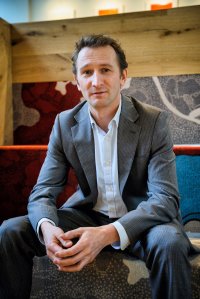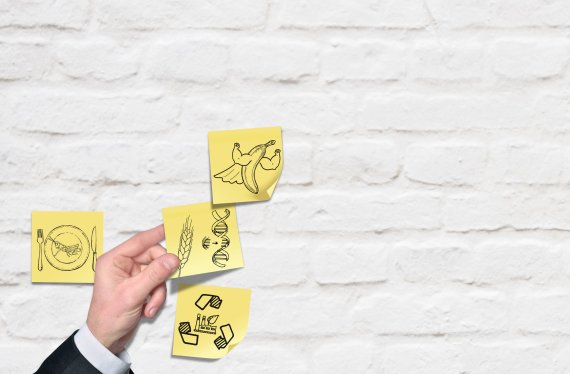text Albert Sikkema illustration Paul GerlachWageningen has a long way to go where academic entrepreneurship is concerned, says Jan Meiling. He is the director of Startlife, the Wageningen organization that helps new companies in the food and agriculture sector. Graduates were traditionally expected to go and work for a company or the public sector; little attention was paid to the option of starting your own company. Researchers were generally not given the opportunity by their managers to make money from their knowledge, for example by running a business part-time. Most Wageningen directors felt that their inventions and patents should lead to new research projects for WUR rather than start-ups for the researchers.
That culture has changed in recent years. Wageningen still brings up the rear in rankings of the number of start-ups and spinoffs (see inset) but Meiling sees improvement in both the number and quality of the new companies. Getting to that stage has taken years. ‘Startlife started supporting start-ups 10 years ago. Eight years ago, we started offering loans on soft terms to help start-ups progress more. Three years ago, we started a mentoring programme to assist young entrepreneurs, and for the past 18 months we’ve offered partnerships with companies like Unilever so that starters get feedback and can collaborate more. It’s up to the entrepreneur to make the start-up a success but these conditions do help.’

Fantastic plans
But that does not mean entrepreneurship has become standard practice in Wageningen. ‘There is still a lot of untapped potential among WUR staff,’ concludes Meiling. He thinks the biggest problem is that there are far more good ideas than there are good entrepreneurs. ‘I often hear fantastic plans, in which the researcher also sees a route for turning the know-how into something marketable or of use to society. But it still doesn’t take off because the researchers have doubts, feel they aren’t entrepreneurial enough and lack the capital needed to develop the business.’
That is why Startlife and WUR department Corporate Value Creation are starting a new activity: venture building. ‘We’ll be talking to the research groups to identify proposals and discuss and improve them. If everyone feels that our best chance of creating value from the proposal is via a start-up, then we look for an entrepreneur and a financer, and see whether we can build a company with the researcher, entrepreneur and financer.’
There is still a lot of untapped potential among WUR staff
That is why Startlife and WUR department Corporate Value Creation are starting a new activity: venture building. ‘We’ll be talking to the research groups to identify proposals and discuss and improve them. If everyone feels that our best chance of creating value from the proposal is via a start-up, then we look for an entrepreneur and a financer, and see whether we can build a company with the researcher, entrepreneur and financer.’
Meat substitutes
The aim is to use this approach to create more Wageningen start-ups. Startlife is currently supporting 172 start-ups but only 27 are based in Wageningen. And so far the number of Wageningen entrepreneurs is only growing slowly. Another 30 starters were added last year, but only four came from Wageningen.
However, Meiling expects several high-profile new Wageningen start-ups in the next few years. He expects a lot from shear cell technology, for example, which WUR is using to create meat substitutes. ‘Atze Jan van der Goot, who developed this technology, is an incredibly commercially minded researcher. But the initiative deserves a dedicated, talented individual who has it in them to be a real entrepreneur. We are currently in talks with an entrepreneur and a financer and reckon we will be able to set up this start-up in three months’ time.’
A second prospect is a possible breakthrough in getting Gert Kema’s research on disease-resistant banana varieties to a marketable stage. Kema has already spent five years looking for financers for Musaradix BV, a company that develops banana varieties that are resistant to encroaching soil fungi. Meiling: ‘That is plant breeding work. The technology is tricky and it’s a long-term affair. Also, Kema is an entrepreneurial researcher who enjoys having a finger in more than one pie. But we are now working on a joint venture between Musaradix and an established plant breeding company.’
Organic crop protection
Meiling says that Wageningen students are generally more active and successful in creating new businesses than Wageningen researchers. ‘A lively community has evolved in Starthub, the incubator for start-ups by Wageningen students, with lots of workshops for both students and PhD candidates.’ But Meiling wants more here too. ‘Lots of student businesses stop again after a couple of years. You want a few to carry on growing and have an impact.’
One candidate for such a breakthrough is Melle Hochstenbach’s company Bio-innovations. The Wageningen graduate has had his organic crop protection company for nearly three years now. ‘The company has scaled up production a lot but can barely keep pace with demand from vegetable growers. That is beginning to take off.’
To encourage entrepreneurship amongst WUR staff and students, it is important to attract businesses from outside Wageningen to the campus, says Meiling. ‘We need to create an entrepreneurial atmosphere, where starters and companies can exchange ideas. We are already bringing in a world of entrepreneurs and investors with conferences such as F&A Next. Knowledge is one of Wageningen’s strong points, but you also need examples of successful start-ups to get further’.
Little business activity
You can measure how entrepreneurial a university is from the numbers of start-ups (new science companies) per 1000 graduates and spin-offs (new science companies emerging specifically from research at the university) per 1000 researchers. WUR scores poorly on both measures according to figures from U-Multirank. Eindhoven University of Technology is good for 10 start-ups per 1000 graduates, but WUR has only 0.6 per 1000. Where the top Dutch performer (Delft University of Technology) produces 14 spin-offs per 1000 researchers, laggards such as Wageningen, Rotterdam, Groningen and VU University Amsterdam have 1 to 2 companies per 1000 researchers. It should be noted that the Netherlands as a whole scores relatively poorly: global top universities produce between 51 and 215 spin-offs per 1000 researchers.

